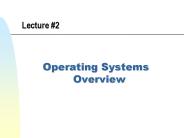OPERATING SYSTEMS AND LANGUAGE TRANSLATORS - PowerPoint PPT Presentation
1 / 16
Title:
OPERATING SYSTEMS AND LANGUAGE TRANSLATORS
Description:
... have to be compiled/interpreted/translated/executed/analysed ... Parsing analysing the components of the program/sentence to work out its syntactic structure ... – PowerPoint PPT presentation
Number of Views:59
Avg rating:3.0/5.0
Title: OPERATING SYSTEMS AND LANGUAGE TRANSLATORS
1
OPERATING SYSTEMS AND LANGUAGE TRANSLATORS
- CIS 2380
- TERM 2 LANGUAGE TRANSLATORS
- Lee McCluskey lee_at_hud.ac.uk
- TERM 1 OPERATING SYSTEMS
- Roger England r.england_at_hud.ac.uk
2
TERM 2 resources
- http//scom.hud.ac.uk/scomtlm/cas380/
- There will be a link from Blackboard..
3
TERM 1 format
- 1 Lecture 1 Tutorial or Practical
- A mix of practical theory.
4
Assessment
- Exam (70) examining BOTH terms but concentrating
on term 2.
5
Language Translators
- Computer Systems are full of FORMAL LANGUAGES
HTML, XML, Java, Pascal, BNF, Z, VDM, Python,
Lingo, C - There are languages for programming, for data,
for database manipulation, for mark-up, for
specification .. - Sentences (programs) of LANGUAGES have to be
compiled/interpreted/translated/executed/analysed - by programs
6
Compilers
- Are the most commonly known language translator
- A COMPILER translates a program P written in a
HIGH LEVEL language into a program Q written in
a LOW LEVEL language eg Java -gt Byte code - Question what is the relationship between
programs P and Q ??????????
7
Interpreters
- Are commonly known language translators
- What is the difference between Interpreters and
Compilers?
8
Interpreters
- Are commonly known language translators
- What is the difference between Interpreters and
Compilers? - ANSWER Interpreters analyse a program written in
a HIGH LEVEL language AND execute it. Eg
languages such as Prolog, Scheme, Haskell, Basic
have interpreters - Compilers analyse then translate,
- Interpreters analyse then execute.
- Interpreted code execution is invariably slower
than compiled code execution..
9
Some Jargon
- Syntax the marks or symbols used in a
language - Syntax Specification the set of symbols used in
a language and the legal order that they may
occur - GRAMMARS are often used to precisely specify
syntax of languages
10
Some Jargon
- Lexical Analysis analysing the characters that
make up program/sentence syntax to work out the
components of the program/sentence - Eg I f ( x x x x 2 3 4 5 ) y y y 4 2
ETC - Are a sequence of characters. After lexical
analysis this might translate to - Keyword(if) openbracket identifier(xxxx)
operator() integer(2345) closedbracket
Identifier(yyy) operator() integer(42) .
11
Some Jargon
- Parsing analysing the components of the
program/sentence to work out its syntactic
structure - IF-construct
- Keyword(if) openbracket identifier(xxxx)
operator() integer(2345)
Boolean Expression
Statement
12
TERM 2 contents
- Theory of Languages revision, Grammars and
Properties of Grammars - Lexical Analysis, Scanning
- Parsing
- Automated Parser Generation
- Symbol Tables
- Code Generation
CODE ANALYSIS
13
Related Subjects
- Software Design Compilers/interpreters can be
very complex programs they require good
software development skills - Theory of computing A great deal of the theory
of automata, and grammars, is used to inform the
practical pursuit of building language
translators - Syntax and Semantics of Programs You have to
know how a language is structured, and what a
language means before you can write a translator
14
Resources for TERM 2
- Main Book Andrew Appel Modern Compiler
Implementation in Java. There are many copies in
the library. We will cover the first 100 or so
pages. - Other Books There are many books on Compilers
all are worth looking at for background. - Website This forms the module hand book, as it
has most of the teaching resources, the lecture
plan, and the coursework - There are links to other resources from the
website an online book, and some other lecture
notes - Lecture Slides, most tutorial/practical sheets
and most answers to questions are all on the
website - NB I may change some of the lecture slides /
tutorials for this year. The coursework will be
different also!
15
Resources for TERM 2
- The MAIN practical tool for this term is
- JavaCup
- This is a PARSER-GENERATOR
- we will use it to generate parsers automatically
from syntax specifications
16
Tutorial this week
- Find the website
- http//scom.hud.ac.uk/scomtlm/cas380/
- Work through the exercises in Week 1. These are
REVISION. If you are happy with a question move
on to the next. - Some of the answers appear on the website.
- See
- http//www.javaworld.com/javaworld/jw-02-2003/jw-0
207-java101.html































